| Listing 1 - 10 of 14 | << page >> |
Sort by
|
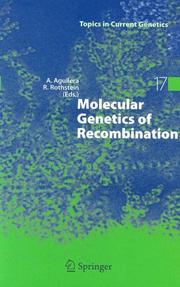
ISBN: 9783540710202 3540710205 3540710213 Year: 2007 Publisher: Berlin ; New York : Springer,
Abstract | Keywords | Export | Availability | Bookmark
 Loading...
Loading...Choose an application
- Reference Manager
- EndNote
- RefWorks (Direct export to RefWorks)
Genetic recombination is an important process involved in shaping the genetic make up of progeny. Increasingly, it has become evident that recombination is a DNA repair pathway crucial during DNA replication in vegetatively growing cells. It plays a critical role in preserving the integrity of the genome by mediating the repair of DNA damage, which can occur during normal cellular metabolism as a result of oxidative stress, transcription, replication fork stalling or breakdown, or after the exposure to DNA damaging agents. Until recently, much of our knowledge on the mechanisms of genetic recombination has come from studies of prokaryotic and simple eukaryotic fungal systems. However, these studies have now been significantly extended to mammals, such that a comparative picture of the general factors and mechanisms of genetic recombination is beginning to emerge. Detailed genetic and biochemical studies have led to the isolation and characterization of many of the recombination-repair proteins in E. coli and S. cerevisiae, which in turn has led to the identification of homologues in human cells. The link between recombination defects and recombination proteins in a number of tumors as well as in human hereditary syndromes makes genetic recombination a cellular process of key importance not only in basic biology but also in biomedical studies.
Recombination, Genetic --- Cell Cycle --- DNA --- Genetic recombination. --- Molecular genetics. --- Recombinaison génétique --- Génétique moléculaire --- genetics. --- physiology. --- metabolism. --- Recombination, Genetic. --- Research. --- Genetic recombination --- Molecular genetics --- Metabolism --- Physiology --- Genetics --- Genetic Processes --- Biology --- Biological Science Disciplines --- Nucleic Acids --- Metabolic Phenomena --- Cell Physiological Processes --- Nucleic Acids, Nucleotides, and Nucleosides --- Natural Science Disciplines --- Phenomena and Processes --- Cell Physiological Phenomena --- Genetic Phenomena --- Chemicals and Drugs --- Disciplines and Occupations --- Cytology --- Health & Biological Sciences --- Life sciences. --- Biochemistry. --- Cell biology. --- Microbial genetics. --- Microbial genomics. --- Plant genetics. --- Animal genetics. --- Life Sciences. --- Cell Biology. --- Biochemistry, general. --- Microbial Genetics and Genomics. --- Plant Genetics & Genomics. --- Animal Genetics and Genomics. --- Molecular biology --- Chromosomes --- Recombinant DNA
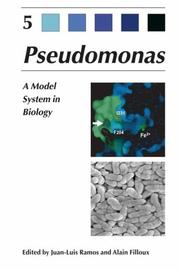
ISBN: 1280957832 9786610957835 1402060971 1402060963 9048175348 Year: 2007 Publisher: Dordrecht : Springer Netherlands : Imprint: Springer,
Abstract | Keywords | Export | Availability | Bookmark
 Loading...
Loading...Choose an application
- Reference Manager
- EndNote
- RefWorks (Direct export to RefWorks)
Pseudomonas volume 5 is intended to collect new information on the genomics of saprophytic soil Pseudomonas, as well as functions related to genomic islands. Pseudomonas are ubiquitous inhabitants and this volume explores life styles in different settings and sheds further insights on the wide metabolic potential of this microbe for the removal of pollutants and production of added-value products. This volume also explores how Pseudomonas responds and reacts to environmental signals, including detection of cell density. This fifth volume covers the following topics: - Genomics - Physiology and metabolism - Databases - Gene regulation - Pathogenesis - Catabolism and biotransformations. Pseudomonas volume 5 will be of use to researchers working on these bacteria, particularly those studying virulence, genomics, physiology, biotechnology, biotransformations, etc. Advanced students in biology, medicine and agronomy will also find this volume a valuable reference during their studies.
Pseudomonas. --- Molecular microbiology. --- Microorganisms --- Molecular bacteriology --- Microbiology --- Molecular biology --- Pseudomonadaceae --- Molecular aspects --- Bacteriology. --- Microbiology. --- Biotechnology. --- Genetic engineering. --- Proteomics. --- Medical Microbiology. --- Applied Microbiology. --- Genetic Engineering. --- Proteins --- Designed genetic change --- Engineering, Genetic --- Gene splicing --- Genetic intervention --- Genetic surgery --- Genetic recombination --- Biotechnology --- Transgenic organisms --- Chemical engineering --- Genetic engineering --- Microbial biology --- Biology --- Medical microbiology.
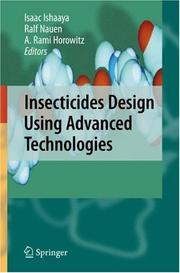
ISBN: 1281086606 9786611086602 3540469079 3540469044 364207989X Year: 2007 Publisher: Berlin, Heidelberg : Springer Berlin Heidelberg : Imprint: Springer,
Abstract | Keywords | Export | Availability | Bookmark
 Loading...
Loading...Choose an application
- Reference Manager
- EndNote
- RefWorks (Direct export to RefWorks)
In the past, insecticide development has been guided mostly by chemo-rational and bio-rational design based on understanding of the physiology and ecology of insects and crops. A limitation in each new class of compounds is the evolution of resistance in populations of key pests, which ultimately leads to control failures. This phenomenon and the desire to produce more selective and biorational compounds serve as the driving force to develop advanced technologies for insecticide design. Among the highlights of this book are the use of nanotechnology to increase potency of available insecticides, the use of genetic engineering techniques for controlling insect pests, the development of novel insecticides that bind to unique biochemical receptors, the exploration of natural products as a source for environmentally acceptable insecticides, and the use of insect genomics and cell lines for determining biological and biochemical modes of action of new insecticides.
Insecticides. --- Insecticides --- Mechanism of action. --- Pesticides --- Agriculture. --- Biochemistry. --- Nanotechnology. --- Environmental management. --- Genetic engineering. --- Animal physiology. --- Biochemistry, general. --- Environmental Management. --- Genetic Engineering. --- Animal Physiology. --- Animal physiology --- Animals --- Biology --- Anatomy --- Designed genetic change --- Engineering, Genetic --- Gene splicing --- Genetic intervention --- Genetic surgery --- Genetic recombination --- Biotechnology --- Transgenic organisms --- Environmental stewardship --- Stewardship, Environmental --- Environmental sciences --- Management --- Molecular technology --- Nanoscale technology --- High technology --- Biological chemistry --- Chemical composition of organisms --- Organisms --- Physiological chemistry --- Chemistry --- Medical sciences --- Farming --- Husbandry --- Industrial arts --- Life sciences --- Food supply --- Land use, Rural --- Physiology --- Composition
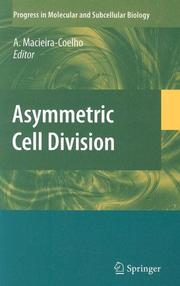
ISSN: 00796484 ISBN: 9783540691617 9783540691600 354069160X 3642088651 3540691618 Year: 2007 Volume: 45 Publisher: Berlin, Heidelberg : Springer Berlin Heidelberg : Imprint: Springer,
Abstract | Keywords | Export | Availability | Bookmark
 Loading...
Loading...Choose an application
- Reference Manager
- EndNote
- RefWorks (Direct export to RefWorks)
Cell biologists have recently become aware that the asymmetry of cell division is an important regulatory phenomenon in the fate of a cell. During development, cell diversity originates through asymmetry; in the adult organism asymmetric divisions regulate the stem cell reservoir and are a source of the drift that contributes to the aging of organisms with renewable cell compartments. Because of the concept of semi-conservative DNA synthesis, it was thought that the distribution of DNA between daughter cells was symmetric. The analysis of the phenomenon in cells during mitosis, however, revealed the asymmetry in the distribution of the genetic material that creates the drift contributing to aging of mammals. On the other hand, cancer cells can originate from a deregulation of asymmetry during mitosis in particular during stem cell expansion. The book describes the phenomenon in different organisms from plants to animals and addresses its implications for the development of the organism, cell differentiation, human aging and the biology of cancers.
embryologie (geneeskunde) --- histologie --- Histology. Cytology --- Oncology. Neoplasms --- General embryology. Developmental biology --- oncologie --- cytologie --- Cell division --- Cell differentiation --- Genetic recombination --- Symmetry (Biology) --- Biodiversity --- Cellules --- Recombinaison génétique --- Molecular aspects --- Genetic aspects --- Division --- Life Sciences --- Biology --- Molecular biology --- Biologie moléculaire --- Biologie moléculaire --- MDBIOCHE --- Cell differentiation. --- Cell division. --- Developmental biology. --- Cytology. --- Oncology. --- Developmental Biology. --- Cell Biology. --- Cancer Research. --- Tumors --- Cell biology --- Cellular biology --- Cells --- Cytologists --- Development (Biology) --- Growth --- Ontogeny --- Cell biology. --- Cancer research. --- Cancer research
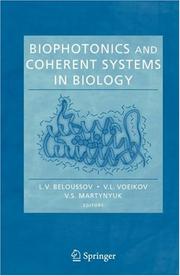
ISBN: 1280743751 9786610743759 0387284176 0387283781 1441939407 Year: 2007 Publisher: New York, NY : Springer US : Imprint: Springer,
Abstract | Keywords | Export | Availability | Bookmark
 Loading...
Loading...Choose an application
- Reference Manager
- EndNote
- RefWorks (Direct export to RefWorks)
Biophotonics and Coherent Systems in Biology L.V. Beloussov, V.L.Voeikov and V.S. Martynyuk Biophotonics and Coherent Systems in Biology offers a timely research volume derived from papers submitted at the 3rd International Alexander Gurwitsch Conference. Biophotonics and Coherent Systems in Biology covers the major aspects of modern biophotonics and related biological and biophysical problems of interest to researchers today. Key topics include: • Coherency of biophoton emission and its related physical and biological properties • Biological effects of microwaves • Photon emission from living samples, starting from human bodies up to cell cultures • Fundamental role of water in bioenergetics and the influence of electromagnetic fields upon hydrophobic-hydrophilic balance • Philosophical problems associated with holistic concepts of biological organization • History of biophotonics, starting from pioneering works of Alexander Gurwitsch and his school (1920-1950) The Editors: Dr. Lev V. Beloussov, Chair of Embryology, Faculty of Biology, Lomonosov Moscow State University (MSU), Moscow, Russia. Dr. L.V. Beloussov is a Professor of Embryology at the Moscow State University (MSU). His scientific interests are associated with the problems of morphogenesis and biophysical factors of development. Dr. Beloussov is a head of the Laboratory of Developmental Biophysics, MSU, a member of the Russian Academy of Natural Sciences and a member of the Directorial Board of the International Institute of Biophysics. Dr. Vladimir L. Voeikov, Chair of Bioorganic Chemistry, Faculty of Biology, Lomonosov Moscow State University (MSU), Moscow, Russia. Dr. Voeikov is a Professor of MSU, Doctor of Biological Sciences (Biophysics and Physiology). He is a member of the Board of Directors of International Institute of Biophysics (Neuss, Germany). Dr. Voeikov was one of the first to apply biophotonic approach to studies of bioenergetic properties of whole blood and different aqueous systems including drinking water and to suggest that aqueous systems may persist in highly non-equilibrium state due to direct oxidation of water by oxygen and its reactive species. Dr. Victor S. Martynyuk, Crimean Scientific Center of National Academy of Science of Ukraine and Ministry of education and Science of Ukraine, National Taras Shevchenko University of Kyiv, Ukraine. Dr. V. Martnyuk is a scientific secretary at Crimean Scientific Center of NAS and MES of Ukraine, senior lecturer on the Biophysical Department at National Taras Shevchenko University of Kyiv, scientific secretary of Ukrainian Biophysical Society, and one of the leaders in bioelectromagnetics research in Ukraine.
Photobiology --- Photon emission --- Photons --- Biological systems --- Gurwitsch, Alexander. --- Emission of photons --- Photon bremsstrahlung --- Photon radiation --- Radiation, Photon --- Bremsstrahlung --- Emission --- Biotechnology. --- Biomedical engineering. --- Genetic engineering. --- Toxicology. --- Biomedical Engineering and Bioengineering. --- Biological and Medical Physics, Biophysics. --- Genetic Engineering. --- Pharmacology/Toxicology. --- Chemicals --- Medicine --- Pharmacology --- Poisoning --- Poisons --- Designed genetic change --- Engineering, Genetic --- Gene splicing --- Genetic intervention --- Genetic surgery --- Genetic recombination --- Biotechnology --- Transgenic organisms --- Clinical engineering --- Medical engineering --- Bioengineering --- Biophysics --- Engineering --- Chemical engineering --- Genetic engineering --- Toxicology --- Biophysics. --- Biological physics. --- Pharmacology. --- Drug effects --- Medical pharmacology --- Medical sciences --- Chemotherapy --- Drugs --- Pharmacy --- Biological physics --- Biology --- Physics --- Physiological effect
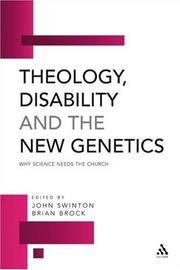
ISBN: 9780567045430 0567045439 0567045587 9780567045584 Year: 2007 Publisher: London T & T Clark
Abstract | Keywords | Export | Availability | Bookmark
 Loading...
Loading...Choose an application
- Reference Manager
- EndNote
- RefWorks (Direct export to RefWorks)
Recent developments in genetic technology promise to eradicate disease and disability. Such promises pose challenging questions with regard to our understanding of what it is to be human. Taking a Christian and theologically informed viewpoint, this book explores and challenges our concept of disability. This book will seek to explore the question: does our current attitude toward the use of genetic technologies in contemporary practice risks a slide into social habits which are implicitly evil and destructive of the humanness of our society ? The central theological question that will be addressed by the book is: Is the image of humanness that underpins the implicit and explicit assumptions of new genetic technology compatible with Christian theological understandings of what it means to be human and to live humanly ? This book aims to explore these questions within a multidisciplinary context with a view to developing an informed practical theological perspective which can guide the theory and practice of the church as it engages with the world around the complex issues that are emerging in response to new genetic technology. John Swinton, and Brian Brock have drawn together an international team of the top scholars from medicine, ethics and theology to produce a unique text which will lay out the complex problems genetic technology raises, and offer fresh understandings and solutions that are theoretically significant and practically vital.
Genetic engineering --- -Church work with people with disabilities. --- Christian ethics. --- 241.63*5 --- 241.63*5 Theologische ethiek: bio-ethiek (bioethiek); genetische experimenten; transplantatie; eugenetica --- Theologische ethiek: bio-ethiek (bioethiek); genetische experimenten; transplantatie; eugenetica --- Ethical theology --- Moral theology --- Theology, Ethical --- Theology, Moral --- Christian life --- Christian philosophy --- Religious ethics --- Church work with the handicapped --- People with disabilities --- Designed genetic change --- Engineering, Genetic --- Gene splicing --- Genetic intervention --- Genetic surgery --- Genetic recombination --- Biotechnology --- Transgenic organisms --- Religious aspects --- -Christianity. --- Christian ethics --- Church work with people with disabilities --- Religious aspects&delete& --- Christianity --- Church work with people with disabilities. --- Christianity. --- Genetic engineering - Religious aspects - Christianity.
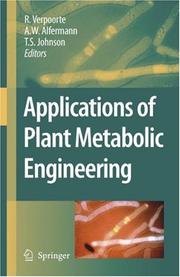
ISBN: 1280960108 9786610960101 1402060319 1402060300 9048175100 Year: 2007 Publisher: Dordrecht : Springer Netherlands : Imprint: Springer,
Abstract | Keywords | Export | Availability | Bookmark
 Loading...
Loading...Choose an application
- Reference Manager
- EndNote
- RefWorks (Direct export to RefWorks)
Written by leading international experts in the field of plant metabolic engineering, this book discusses, mainly, applications of plant metabolic engineering. Metabolic engineering, which is part of second generation biotechnology, has made several contributions at basic level as well as at conceptualising products ever since its emergence in the early 1980s. Applications resulting from metabolic engineering are expected to play a very important role in future for plant breeding, e.g. for improved resistance or improved traits concerning health promoting constituents, and production of fine chemicals such as medicines, flavors and fragrances. Considering the tremendous progress that has been made since our first book in the year 2000 urgency was felt to bring together cutting edge research in plant metabolic engineering in applied aspects as a handy reference book. This book has been predominantly dedicated to applied research of metabolic engineering, and a part of it has been allotted for fundamental research that has potential applications. This book is a unique source of information for all those involved with plants as chemical factories of fine chemicals and also to more experienced scientists who work on transgenic plants, besides, senior researchers, graduate students, post-doctroral students, teachers and students as well.
Plants --- Plant biotechnology. --- Plant physiology. --- Biochemical engineering. --- Metabolism. --- Bio-process engineering --- Bioprocess engineering --- Biochemistry --- Biotechnology --- Chemical engineering --- Botany --- Physiology --- Crop biotechnology --- Crops --- Agricultural biotechnology --- Plant metabolism --- Metabolism --- Plant physiology --- Effect of anaerobiosis on --- Biochemistry. --- Botany. --- Agriculture. --- Chemistry. --- Genetic engineering. --- Biochemistry, general. --- Plant Sciences. --- Plant Biochemistry. --- Chemistry/Food Science, general. --- Genetic Engineering. --- Designed genetic change --- Engineering, Genetic --- Gene splicing --- Genetic intervention --- Genetic surgery --- Genetic recombination --- Transgenic organisms --- Physical sciences --- Farming --- Husbandry --- Industrial arts --- Life sciences --- Food supply --- Land use, Rural --- Botanical science --- Phytobiology --- Phytography --- Phytology --- Plant biology --- Plant science --- Biology --- Natural history --- Biological chemistry --- Chemical composition of organisms --- Organisms --- Physiological chemistry --- Chemistry --- Medical sciences --- Composition --- Plant science. --- Plant biochemistry. --- Phytochemistry --- Plant biochemistry --- Plant chemistry --- Phytochemicals --- Plant biochemical genetics --- Floristic botany
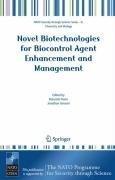
ISBN: 9781402057977 1402057970 1402057989 9786610902019 1280902019 1402057997 Year: 2007 Publisher: Dordrecht : Springer,
Abstract | Keywords | Export | Availability | Bookmark
 Loading...
Loading...Choose an application
- Reference Manager
- EndNote
- RefWorks (Direct export to RefWorks)
The intent of the NATO Advanced Study Institute (ASI) entitled “Novel Biotechnologies for Biocontrol Agent Enhancement and Management” was to permit the meeting of the major exponents in the scienti?c community working with enhancing different biological control agents (fungi, bacteria, virus, nematodes, and insects) on different targets (pathogens, insects, weeds, and rodents). This multidisciplinary group, having backgrounds in the different aspects of biotechnologies (transgenic enhancement, molecular biology, formulation, genetics, risk assessment, new technology, biochemistry, and physiology), presented highly advanced lectures during the 10-day-ASI, in order to allow students to improve their capability to enhance and manage biological control agents. This approach will allow ASI attendees to bring new ideas, new approaches, or new methodologies coming from different fields of application to their own field of expertise. A further aim of the NATO ASI was to create a network of young and experienced scientists, with few geographical barriers among countries, who will develop new opportunities to collaborate in this field of science that requires a “global” collaborative approach. Forty students from twenty countries took part to the NATO ASI. In addition to the 45 lectures from the 15 lecturers, there were 25 short presentations and 8 posters on cogent research from students in this course, held between September 8- 2006 and September 19, 2006.
Biological pest control agents -- Congresses. --- Pests -- Biological control -- Congresses. --- Weeds -- Biological control -- Congresses. --- Weeds -- Control -- Molecular aspects -- Congresses. --- Biochemical engineering. --- Pests --- Control. --- Chemical control of pests --- Control of pests --- Eradication of pests --- Extermination of pests --- Pest control --- Pest eradication --- Pest extermination --- Pest management --- Bio-process engineering --- Bioprocess engineering --- Chemical control --- Eradication --- Extermination --- Management --- Chemistry. --- Biotechnology. --- Genetic engineering. --- Agriculture. --- Plant pathology. --- Plant Pathology. --- Genetic Engineering. --- Biochemistry --- Biotechnology --- Chemical engineering --- Plant diseases. --- Farming --- Husbandry --- Industrial arts --- Life sciences --- Food supply --- Land use, Rural --- Genetic engineering --- Designed genetic change --- Engineering, Genetic --- Gene splicing --- Genetic intervention --- Genetic surgery --- Genetic recombination --- Transgenic organisms --- Botany --- Communicable diseases in plants --- Crop diseases --- Crops --- Diseases of plants --- Microbial diseases in plants --- Pathological botany --- Pathology, Vegetable --- Phytopathology --- Plant pathology --- Plants --- Vegetable pathology --- Agricultural pests --- Crop losses --- Diseased plants --- Phytopathogenic microorganisms --- Plant pathologists --- Plant quarantine --- Pathology --- Diseases and pests --- Diseases --- Wounds and injuries
Book
ISBN: 9783540753759 3540753753 3642094600 3540753761 Year: 2007 Publisher: Berlin, Heidelberg : Springer Berlin Heidelberg : Imprint: Springer,
Abstract | Keywords | Export | Availability | Bookmark
 Loading...
Loading...Choose an application
- Reference Manager
- EndNote
- RefWorks (Direct export to RefWorks)
The past two decades have witnessed an enormous progress in our understanding of plastid (chloroplast) biology. Basic principles of plastid biogenesis, genome structure and function, gene expression and its regulation as well as plastid-nuclear interaction and communication pathways have been elucidated. In addition, the possibility to directly alter the genetic information of the plastid by transformation has facilitated the study of virtually all aspects of plastid biology in vivo and, moreover, has paved the way to diverse applications of transgenic plastids in biotechnology. The present book provides a comprehensive overview of our current knowledge on plastid biogenesis, plastid-nuclear communication, the regulation of plastid gene expression at all levels, and also assesses the state of the art in key technologies, such as proteomics and chloroplast transformation. Written by recognized experts in the field, it covers plastid differentiation and division, genome structure and function, plastid inheritance, recombination, DNA replication and repair, transcription, RNA processing and translation as well as crucial posttranslational processes in plastid biogenesis and function, including protein processing, the assembly of multiprotein complexes, protein stability and degradation, protein import and sorting.
Genetic recombination --- Plastids --- Plant molecular biology --- Recombinaison génétique --- Plastes --- Biologie moléculaire végétale --- Plant molecular biology. --- Plant Proteins -- Genetics. --- Plastids -- Genetics. --- Plastids -- Metabolism. --- Plastids. --- Recombination, Genetic. --- Gene Expression Regulation, Plant --- Genetics --- Metabolism --- Plant Proteins --- Recombination, Genetic --- Proteins --- Organelles --- Biology --- Metabolic Phenomena --- Gene Expression Regulation --- Genetic Processes --- Genetic Phenomena --- Phenomena and Processes --- Biological Science Disciplines --- Cytoplasmic Structures --- Amino Acids, Peptides, and Proteins --- Natural Science Disciplines --- Cytoplasm --- Chemicals and Drugs --- Disciplines and Occupations --- Intracellular Space --- Cellular Structures --- Cells --- Anatomy --- Cytology --- Plant Physiology --- Botany --- Earth & Environmental Sciences --- Health & Biological Sciences --- Molecular phytobiology --- Phytobiology, Molecular --- Life sciences. --- Biotechnology. --- Cell biology. --- Plant genetics. --- Plant physiology. --- Plant breeding. --- Life Sciences. --- Cell Biology. --- Plant Genetics & Genomics. --- Plant Physiology. --- Plant Breeding/Biotechnology. --- Molecular biology --- Cell organelles --- Photoreceptors --- Plant cells and tissues --- Plant pigments --- Cytology. --- Plant Genetics and Genomics. --- Chemical engineering --- Genetic engineering --- Crops --- Agriculture --- Breeding --- Plants --- Physiology --- Cell biology --- Cellular biology --- Cytologists
Periodical
Abstract | Keywords | Export | Availability | Bookmark
 Loading...
Loading...Choose an application
- Reference Manager
- EndNote
- RefWorks (Direct export to RefWorks)
Genetic engineering --- Genetic Engineering --- Genetic engineering. --- trends. --- Designed genetic change --- Engineering, Genetic --- Gene splicing --- Genetic intervention --- Genetic surgery --- Genetic recombination --- Biotechnology --- Transgenic organisms --- trends --- Intervention, Genetic --- Genetic Intervention --- Genetic Interventions --- Interventions, Genetic --- Cloning, Molecular --- DNA, Recombinant --- Industrial Microbiology --- Artificial Gene Fusion --- Organisms, Genetically Modified --- Animals, Genetically Modified --- Plants, Genetically Modified --- Electronic journals. --- Periodical. --- Cyber journals --- Cyber magazines --- Cyber periodicals --- Cyber serials --- E-journals --- Ejournals --- Electronic magazines --- Electronic periodicals --- Electronic serials --- Internet journals (Electronic publications) --- Internet magazines (Electronic publications) --- Internet periodicals (Electronic publications) --- Internet serials (Electronic publications) --- Online journals --- Online magazines --- Online periodicals --- Online serials --- Periodicals in machine-readable form --- Web journals (Electronic publications) --- Web magazines (Electronic publications) --- Web periodicals (Electronic publications) --- Web serials (Electronic publications) --- World Wide Web journals (Electronic publications) --- World Wide Web magazines (Electronic publications) --- World Wide Web periodicals (Electronic publications) --- World Wide Web serials (Electronic publications) --- Electronic publications --- Periodicals --- Chemistry --- Chemical Engineering
| Listing 1 - 10 of 14 | << page >> |
Sort by
|

 Search
Search Feedback
Feedback About
About Help
Help News
News